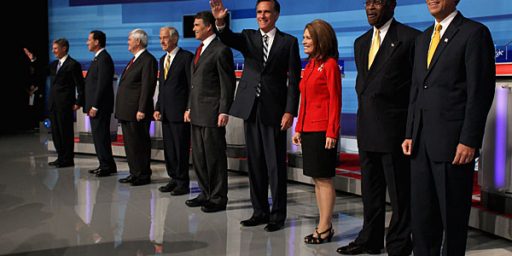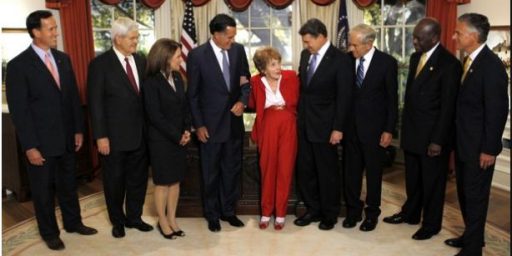Most Contested/Edited Wikipedia Entries
The Economist has an infographic up showing the most heavily edited Wikipedia entries by language.
Here’s the list for English (not in order):
3. Muhammad
4. Anarchism
As Mark Perry notes, it’s no surprise that the first three are subject to arguments among Wikipedia denizens. And I suppose the same can be said about the fourth on the list. But, what explains this one?
Now I’ll admit its been awhile since I’ve followed professional wrestling, but has it really become this controversial?






I thought I saw where most of the hotly contested ones were about soccer? But maybe not in English.
Note btw that controversy isn’t shown by edits, which can simply add info, but by reverts, where an edit is undone; the Economist’s chart properly shows the latter.
Most edits doesn’t necessarily denote controversy. No. 5 just could be a result of the fact that WWE is constantly bringing in new people and letting unsuccessful ones go.
Stormy Dragon has it right; WWE is constantly bringing in new talent and releasing existing wrestlers, to the point that keeping track of who is actually under contract to them is a real challenge.
We wait patiently for the final update to GWB’s entry: “died in federal prison serving 327 consecutive life terms for lie after lie after lie that led to war crimes that nearly took down a great nation.”
Nearly. We shall not go quietly in that Good-night.
Seat grand juries today.
@James in Silverdale, WA: Ya know if we could dig up Lyndon Johnson and Nixon and prosecute them too I’d be glad to sit on that jury!
I wonder if Canada would have to extradite Heinz Alfred Kissinger if he fled there to avoid
the draftprosecution?@James in Silverdale, WA: “Good-night” or “goodnight” is what you say when someone’s going to bed “Good night” is a description of a night.
The Dylan Thomas quote is “do not go gentle into that good night”. You could go quietly into that good night, I suppose, but you couldn’t go quietly into that good-night, and generally we don’t talk about going into night, so I’m not sure I would have used a paraphrase of the line.
As for the lies, given that intelligence agencies reported that Iraq was developing and had used weapons of mass destruction, and an error isn’t a lie unless it’s told deliberately, what were Bush’s lies?
@James in Silverdale, WA: Also – how could someone serve 327 consecutive life terms? A person could serve one life term, and people may be sentenced to multiple life terms, but you can’t serve multiple life terms consecutively.
And why would there need to be multiple grand juries? For each life that Bush would spend in prison, maybe?
And in the last comment, I forgot to note that you capitalized “Good-night”. I’m not sure what you were going for there.
@Pinky:
Granted, calling them “Bush’s lies” might be oversimplifying, but then again, using someone else’s lies for your own agenda and portraying them as truth when every other intelligence agency is telling you the claims are dubious at best, not the sort of thing you can justly start a war over…
One can talk about what makes a lie (I tend to agree with you that it’s the intent to deceive; the liar needs to know the truth in order to lie about it), but the public was deceived by those in power who should have known better, who did by all accounts know better, and chose to go forward anyway. Lying? No, but the results of the deception speak for themselves. It’s not worth the time to worry about the moral distinction of the act in the face of the consequences.
@Tillman:
I don’t believe that’s ever true. By that standard you couldn’t distinguish between the 19 hijackers and a pilot who accidentally crashes a plane.
Buf if you believe it, you should be directing it at James, the guy who accused Bush of lying.
@Pinky: See, to me, that’s the kind of moral absolutism that obfuscates more than it clarifies. 19 hijackers crash a plane into a building, a drunk pilot crashes a plane into a building. Either way, the building collapses and a lot of people die. One’s rage might change from why the hijackers crashed the plane to the idiocy of one fool depending on the hypothetical, but one’s grief over the death and destruction does not. I’ve found grief sticks around longer than rage.
Also, it is the height of folly (to me) to argue over degrees of moral exculpation when hundreds of thousands have died and millions more have been displaced. It’s not that the morality of the actions which led to it all is insignificant, it’s that the consequences of them are so ludicrously awful as to outweigh the consideration.
@Tillman: How does it obfuscate? What information is lost?
@Pinky: It’s a distraction. Like I said, the consequences are so staggering that the beginning doesn’t matter as much as it normally would. No information loss, but if you were typing up something quick, you’d end up oversimplifying like “Bush’s lies” does.
@Tillman: I don’t have a problem with simplification when typing quickly (as long as the details are available elsewhere and you’re willing to explain them if someone expresses interest and there’s more time). The problem with “Bush lies” is that it’s inaccurate.
I wouldn’t say that the tragedy of the Vietnam War is so overwhelming that there’s no point in explaining its causes or considering who is responsible for what. But I definitely wouldn’t short-hand it by saying that Spain was responsible – because that’s not factual.
And do you really believe that the Iraq War’s magnitude prevents us from considering the morality of it? How is that a distraction?
@Pinky: Now that I think about it, it’s your approach that leads to distraction. I want to consider the outcome and the morality. You’re saying that thinking about the morality will distract us from the outcome, but in truth, thinking about the outcome is distracting you from the morality.
@Pinky:
Obviously I have considered the morality of it, as I wrote:
I’m saying distinguishing between a lie and garden-variety misleading and fudging of facts is a waste of time. There was deception. Saying they were lies is oversimplification if you’re pedantic enough to care in the face of the destruction wrought by the deception. It is a distraction in the sense that you praise accuracy concerning the actions of a few versus the results of those actions, which are far more damning.
We are here debating whether Bush lied or not, instead of whether the Iraq war was worth it at all. That’s the distraction.
@Pinky: See, now you’re just saying I don’t consider the morality at all because a bunch of people died, when above I’ve been saying specific moral arguments concerning historical actors pale in comparison to what they did based on those flimsy degrees of guilt or culpability.
@Tillman: I guess I’m not sure what the distinction is that you’re making. Or are you describing a kind of continuum of importance, with the relative morality of particular people’s choices at the low end of that continuum? In other words, are you saying that the moral perspective is legitimate, but of lesser importance?